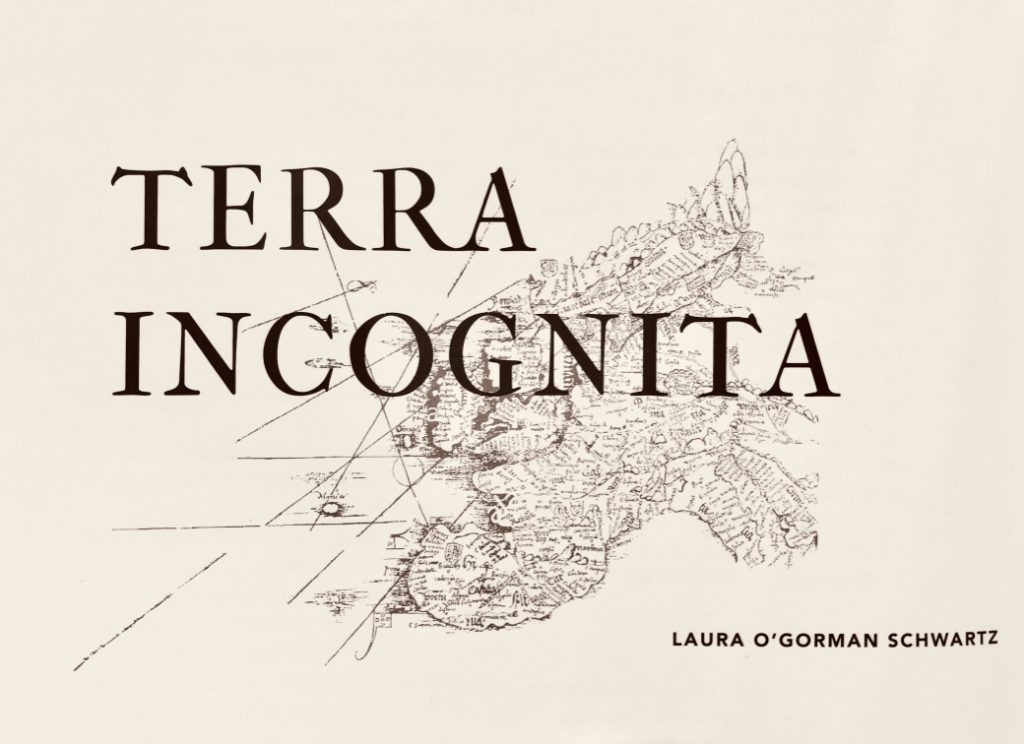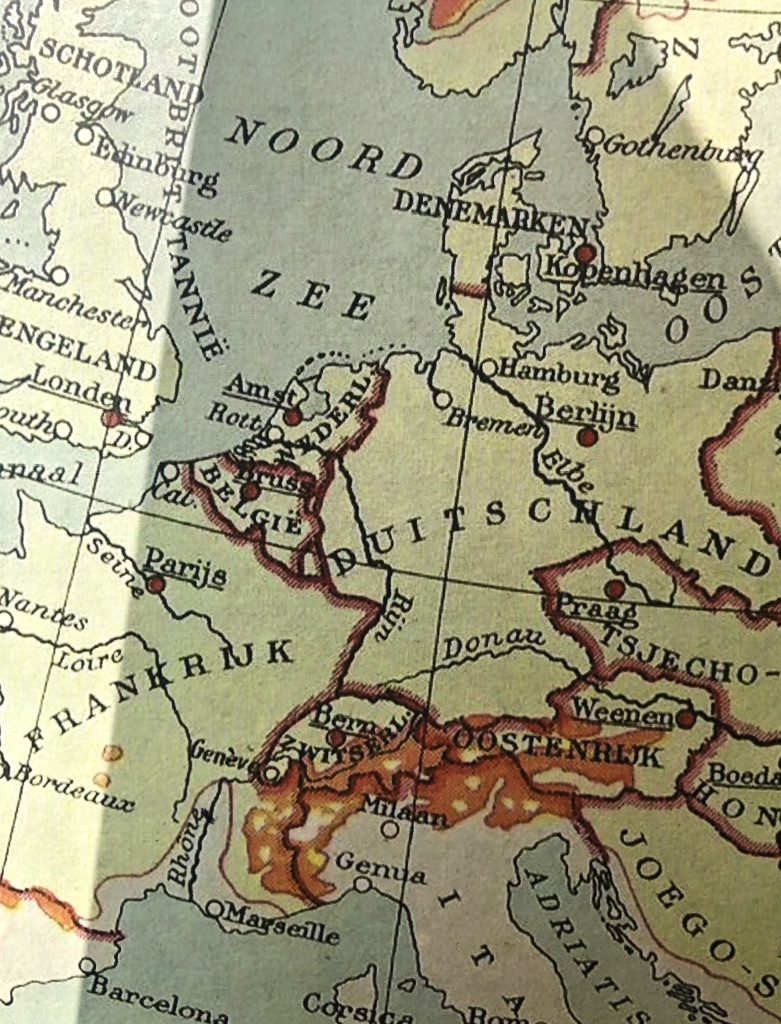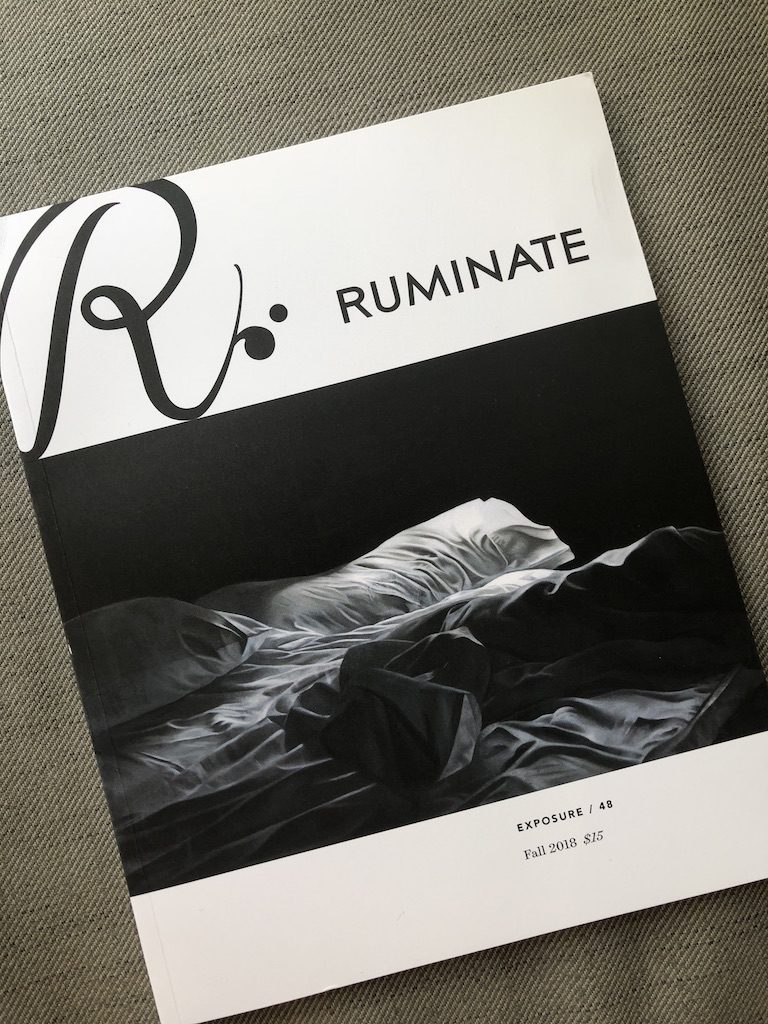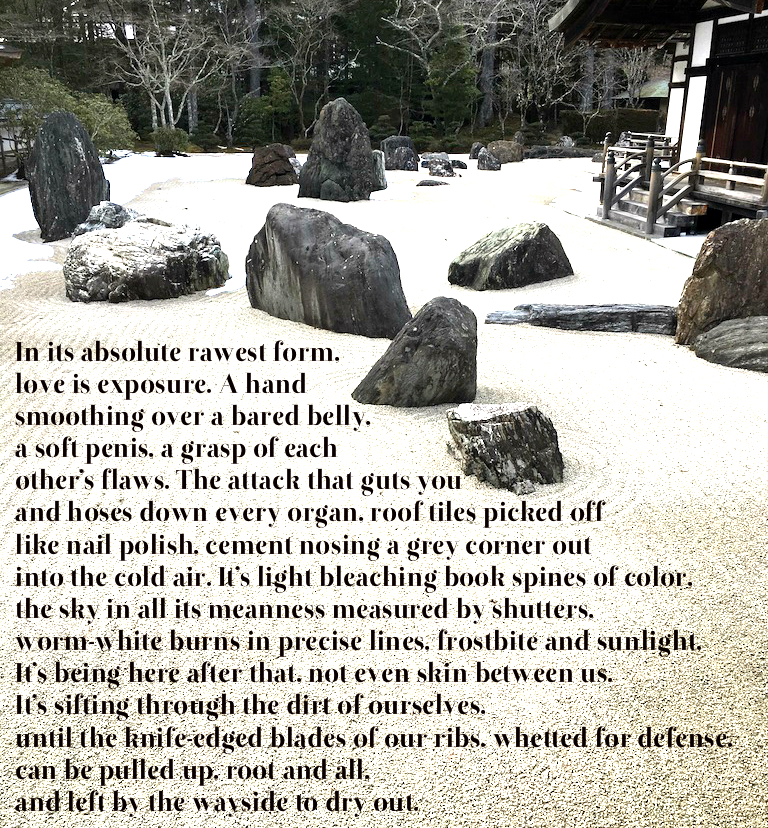Very excited to announce my short story Terra Incognita received Honorable Mention in the 2018 William Van Dyke Short Story Prize and has been published in the Fall 2018 issue of Ruminate Magazine! The theme of this issue was “exposure” and my story is about the impact of a new map arriving in a small town in Flanders in the 15th century.
Yyyyeah, this is one of my weirder ones.

The old map had congealed to the wall, taken on its texture. There was no removing it completely, so they didn’t remove it at all, just pinned the new map on top of it, bottom corners loose and still curled from the roll it had slept in. Word ambled down the street and the neighbors came to see the new face of their country. Big-cheeked Hanna, spackled with flour. Blonde Ria with her skinny husband. The young, curly-haired brothers Isidoor and Thomas. Erik, old and bearded. The very pregnant Juytken. Pretty Jo, the town’s white flower. Philip and his two flunkies – a gang formed in boyhood and cemented by adolescence. A few others. The tavern seemed embarrassed to be so full in midday, caught in the light. Perhaps it was this unusual combination of time and place that dampened their spirits and lent the rosy new map a poisonous sheen.
The town wasn’t invested in books. With no library or school, with the sea far to the northwest, the old map had been a rare window into the country beyond their fields. For some, it had been the only window. Ivo the innkeeper had won it over a decade ago, in a card game with a sailor in Antwerpen in 1504. Ivo hadn’t felt old yet then. Hanna hadn’t been married. Ria’s youngest was still alive. Erik had yet to be widowed. The map had hung above the bar since. It softened with them. The colors lightened. The words gently bled. The tiny ships on the painted waves of the Germanicus Oceanus contracted into strange ink creatures. Over the years, the map ceased to be, or perhaps never was, a representation of their country; in the townspeople’s minds, it was their country.
And in the span of a short morning, the world they believed was aging with them had been replaced with a crisper, more vibrant version. Borders they had come to think of as blurred and gauzy became impenetrable again. A black line squiggled down and around the land, marking the edges, trapping them inside. Even the eternal northwest waters had a new name: Maris Germanici. Hanna and Ria joked and scoffed. As though you could change the name of the sea! More startling, their familiar country was crammed with at least twice as many cities and towns as before, nests of calligraphy punctuated by circles and corralled by weaving roads. The old yellowed map had been spotted with its share of settlements, but the names had long been demoted to decorative details, a pattern for one’s eyes to roost in while a tankard was drained.
Thomas buzzed about, investigating the musty adulthood of the tavern, new territory for the 12-year-old. He tilted his head back to take in the map.
“Have all those towns existed all this time? Or are they new?”
The innocent question was a stab in the ribs of the gathered adults. They didn’t know. As before, Ivo had dabbed a spot of red paint on their town. But the comfort of knowing precisely where they were on the Lord’s green earth had vanished. How could anybody feel found in a crowd like that?
“The old map was better,” Ria declared, blonde eyebrows pinched together. “This one has errors.”
Ivo had left his duties to his overburdened wife in order to preen amongst his neighbors. Though a regular traveler out of town, he hadn’t acquired the map for geographical guidance; for that, he preferred the compass of his own memory. The map drew him for another reason. The warm palette and dark lines, the chocolatey curls and perked ends of the letters, the mellifluousness of the incomprehensible Latin maxim that crowned the frame – the entire composition was pleasing. When his gaze sank into it, a panting horse into a cool river, he felt that his heart and his mind were connected. Closer than connected. That they were the same. Just as black dots on rich paper could also be a sea. Both the sailor’s map and this newer one climbed inside him and stayed there. Art, however, was not a well-trod topic in their town and, if asked, Ivo would have said that he couldn’t say a single word on the subject.
He rounded on Ria.
“This map does not have errors. It’s just more recent.”
“No,” Ria insisted. “There aren’t that many towns.”
“How would you know?”
“It’s common sense. Look at how crushed together all the names are. Are we really supposed to believe there is no countryside in our country? Look outside!”
“I bet the mapmaker invented some towns so he could f-feel important,” Philip asserted, juvenile ego tripped by jitters.
Ivo set his jaw and folded his great arms. Had he known the phrases artist’s interpretation and not true to scale, he would have used them. As it was, he could only sense their unarticulated truth.
“Perhaps you could put both maps up?” Hanna submitted, picking at the dough drying on her knuckles.
“No, I won’t have an out-of-date map on my wall.”
“It was fine for the last ten years and suddenly it’s out of date?” Philip asked with a huff, glancing over at his lackeys.
“We didn’t need a new map,” one said.
“We didn’t want one,” the other added.
“This is my tavern and it’s staying.”
“It’s a disgrace!” Ria snapped in a tight voice. “It’s— What proof do you have that these towns are real? You have no right to spread errors, maybe even lies, about our country.”
She had been like this in childhood too, Ivo remembered. Her temper and tears erupted if you changed the rules midgame, if you told a story differently than before, if you abandoned the plan. Her heels were forever dug into the earth. Ivo pitied her husband, a man who was clipped around the edges and crumpled in.
The argument continued, heating the pub to a stuffiness only enjoyed by the passionately angry or by drinkers on a winter evening. Hanna attempted to placate Ria, but Philip’s gang was teething, hoping for a real fight to chew on. They followed up on Ria’s flares with handfuls of fuel. Younger and slimmer than the other men, curly-haired Isidoor kept both his tongue and his little brother in check. Beautiful Jo was still entranced by the new map and paid attention to none of them. Erik stroked his greying beard and held the door for the waddling Juytken. Age serving youth. Near-death serving near-life.
Blue skies on a market day meant a busy street. Children in filthy smocks brandished sticks and screamed their games. Straw baskets filled, townspeople who had heard the gossip gravitated towards the inn. Erik helped Juytken out of their path.
“You ought to return home. Walking around in your condition is dangerous,” Erik said.
Juytken nodded. The fingers not curled under her pregnant belly were fiddling with the sleeve of her linen undershirt. She studied the knobbed hand Erik rested on his walking stick.
“What do you think of the map?” she asked.
“I’m too old for it to make any difference to me.”
“The world around us changes so quickly. Ten years and the country has been completely redrawn,” Juytken mused, eyes lowered. “How can I know what sort of place my son will grow up in?”
“Take it from me. Some things don’t change.”
Juytken gave him a smile and made her way down the street, layered skirts skimming the earth. Erik monitored her until she turned the corner. Youth cannot believe what Age tells them to be true. It won’t be real until they have aged themselves. But he was correct. Some things didn’t change. A pint of ale will always improve a meal. A new map will always cause an upset. A young wife filled to the brim with life will always be a blessing. It was the natural flow of time. Juytken’s son would be his third grandchild. She was downriver from her mother’s pregnancies and from Erik’s own wife’s, the last of which took her from this realm.
The road east shrank, became a path that bordered the farms. Escorted by his wooden cane, Erik’s steps were unhurried. Sheep bleated and moved as one away from the fencing. Clouds dragged a net of shade across the green fields. And he was an old man wandering after his thoughts, recalling how his wife’s right leg had a slight limp that made her shy. When she died, the priest assured Erik that such a good woman was unquestionably with our Lord in his Kingdom. It was a comfort to hear and it was what Erik repeated to his children, but he was embarrassed to discover that he was unable to imagine his wife in heaven. Erik was never a man for daydreams or fantasies, and he simply couldn’t place the image of her anywhere but home. Since birth, she had fit her years comfortably into their town, a small circle of which her and Erik’s house became the center. Even attending church or walking to the market spurred a frenzy of preparation. Her impatience to return to the cauldron, the cradle, the clutter of half-woven garments, often snipped conversations with neighbors short. A frequent and amicable patron of Ivo’s, Erik had found this tiresome. After her death, it troubled him. How could a woman who had burrowed, body and soul, into this patch of earth, a woman who had never followed the road east beyond the farms, traverse the long journey to heaven?
A chilly breeze slinked through the expanse of sunshine. Erik held his wool cap to his head and listened to the rustling trees. The new map spread itself out in his mind, the precise lines, the four tiny trees, and he was delighted to see a figure on the butter-colored paper, barely more than a dot, traveling through the copse, away from the red heart of their town. The roads were so neatly marked. The rivers. Finally, they both had a guide. The path towards the borders – of the country, of the sea, of the entire map – was distinct yet crossable, even with her uneven gait. After a pause on the edge, she stepped off into an ungraspable realm, a kingdom of faith hidden in the thin air. The thought lightened Erik’s bones and his feet. Sunlight swept across the grass, like satisfaction. Joy, even.

The quarrel at the tavern swelled and receded and swelled again. After failing to douse Ria’s blistering hisses, big-cheeked Hanna – whose heart pounded whenever voices were raised – retreated to the bakery. Young Thomas’s question stalked after her, clinging to the hem of her kirtle.
“Well?” Her husband asked, sweating.
She circled the loaves of bread, retied her apron, shrugged.
“Ria thinks it’s fake, that there are too many towns for it to be a true map.”
“No reason to change what works,” he said, shrugging back.
Grunting, he opened the oven grate and withdrew a pan of hot and fluffy koekjes. The aroma of butter mingled with the brusque smell of charcoal and the autumnal scent of chopped apples resting in a bath of spices. Hanna hunched over the table to pull and knead the dough for appelflappen, massaging it thin with her chubby fingers, loving strokes she had learned years ago, when she married both a man and his trade. No reason to change what works. A recipe can be played with a little – raisins added, perhaps – but the ratio of flour to sugar to fats had long been determined. Like the name of the sea.
“Hanna. Why are you crying?”
“I’m sorry. It’s frightening.”
“The map?”
“Yes.”
“It’s a painted picture. That’s all.”
“I feel small, as though I was a mouse all along.”
“You’re certainly not the size of a mouse,” he chuckled, belly jiggling.
But she didn’t smile. In front of her gaze hung the circle of their village, a droplet once buffered by empty space, now swept up in a swarm. All those towns filled with strangers. All those roots unearthed and bared to the sun. Names for things that didn’t need names. The more men stuck pins into the land, speared it with titles and dimensions, the more it would bleed. A pile of cake ingredients was not appetizing, couldn’t they see that? It was only the whole, the elements combined, that made something sweet and wonderful. Beyond all question, the mystery from which true godliness springs is great. To fear a gnawing appetite for knowledge was humanity’s earliest lesson and still there was this vulgar reaching for higher and higher branches of the tree. One did not inherit the Kingdom of God by dismantling and renaming His creations. Nor by following any ink-sodden map.
If their dear country could erupt in a sudden wealth of new details, like the distant hills sharpening after a storm, then what other unknowns lay hidden, ready to pounce? Insignificance wormed into Hanna for the first time since girlhood and her hands trembled. She could be crushed by so much, all that she couldn’t see and didn’t know. It was one thing to feel small and humble next to the unfathomable glory of one’s Savior, but to be trampled underfoot by unknown armies from unknown cities, the human unknown… Her shoulders rose in a fear that set the Lord’s Prayer rumbling over her tongue.
Its familiar rhythm lulled her back into her work. Dough, apples, sugar. The formulas and measurements, the simple causes and effects, formed a landscape she knew intimately, one she could find shelter in. She would hold to the mystery of faith, the recitations of recipes. Give us this day our daily bread. Warm water and warm milk so the rolls rise properly. Add the flour a tablespoon at a time. And deliver us from evil. Amen.
Hanna wasn’t the only one ruffled by Thomas’s question. It roosted in his elder brother Isidoor’s mind, noisy, feathers and droppings coating his contemplation. Which did he prefer? That other towns had lain cloaked in mist all this time? Or that they had sprung up out of the earth like weeds in a neglected kitchen garden? Ignorance or rapid change? Hoping to avoid the notice of Philip and his drudges, he gave the map his full attention, fluttered from town to town, forwent space and time to touch on all the borders, run down the canals, and pause in places that resembled the names of people he knew. Canegem. Tempelmare. Dadisele. Trechyn. Gendt, of course. Antwerpen. He’d like to see Antwerpen. Just once. Just to peek at the crashing flow of life in an international city, the Italian sugar and Portuguese pepper, the Spanish gold and American silver, the scholars and the sailors in combat with uncertainty. Just to walk alongside men who saw the coast as a starting point instead of an end, who entered into long affairs with the unknown.
And after seeing the worn and weathered faces of these men, Isidoor would be glad to come home. He was sure of it. How little the void attracted him, the opaque waters, the days flung wide open and blinding, especially in comparison to his work, his mother, his brother, the pleasant possibilities and manageable problems he would have here. Thomas, though, would become the type of man that the bottomless sea, with its promise of sugar and silver, would seduce away. Isidoor could only hope that she wouldn’t take his brother’s life as payment for his curiosity.
Isidoor’s eyes descended from the heights of the map to Jo’s pale and freckled face, which glowed in the half-light, framed by a wheat-colored linen hood. They had only spoken two or three times, nodded to each other at the market – her hands separating gourds and cabbages, his full of upside-down and baffled chickens – but for Isidoor she was a clearer map to his future than any. He could see, though, that Ivo’s new atlas held her fast. She seemed deaf to the clamoring newcomers, to Philip’s exaggerated posturing, to the squabble that ended with Ria yanking her husband out the door. Was Jo dreaming of travel, too? Of Gendt or Antwerpen? Of an adventure they could hold up years from now and see their reflections in? It was as though she was having a conversation with the map, a dialogue he didn’t understand and so could not interrupt. He resolved to wait for the right moment.
Philip shouldered past Isidoor, his flunkies trailing him out into the ripening midday. Sounds from the market rushed through the opened door. Isidoor ought to return to the poultry stall; Thomas would need help hauling the sacks of feed. They couldn’t linger any longer. But tomorrow would come, no matter what was drawn on any map, and Isidoor would wash his face, tamp down his curly hair, and ask Jo’s father if he could marry her. His heart quickened at his resolve, but Jo still didn’t look his way.
Before his wife reeled him back to his obligations, Ivo too observed Jo, puzzling over her fixation on the map. She had never granted the old one more than a glance. Her parents and siblings weren’t the sort to chew over these things. He left her in peace. Girls’ fancies were marshes too murky to ford.
At the altar formed by the map and the bar, Jo paled and blushed, hid her flooded eyes and sudden smiles, embraced the storm and then the calm. So. There was no definitive version of their country, of the world. There never would be. If the old map was fallible, a temporary reflection, then the reign of this newer one must be equally precarious. The truth, so fixed, so obvious, could change. It all depended on who drew the map. And really, anyone could draw a map, could sketch the world as it was true for them. A local shepherd’s survey of the land would differ from a foreign merchant’s, but neither would be false. They would simply see with different eyes, sculpted by different lives. Could the truth ever be reached then? Certain atlases might approach it, breathe down its neck. But even if the truth were somehow captured, fully contained in inked borders, one felled tree would change the face of their country into a different creature. And what of other maps, other guides, other truths? All those laws and facts, decreed by God and nature and men and mothers? What makes a lady, what makes a cake, what makes a life… Were they transient too?
“Jo, oughtn’t you get back to the market and help your mother?” Ivo’s wife called over an armful of cleaned linens.
One foot on the stairs, she cracked her neck and waited in vain for a reply. She was unsettled by the… lust, she’d have to call it, in Jo’s eyes. If her parents had any sense, they would get that girl a husband soon. Everyone knew pretty things were a danger to keep around too long. White flowers could be poisonous.
Soul still full of the map, Jo left the tavern and turned down the familiar street, its dips and curves long memorized by her feet. This road and this market, seemingly permanent fixtures in the landscape of her life, were really just one of many roads, one of many markets. In the burn of the late afternoon, the shops and stalls and houses took on the hollow echo and weightlessness of a traveling troupe’s set for a play. It was all manmade, wasn’t it? What was right. What was wrong. What was possible and impossible. The corset of certainties Jo wore – marriage was her next step, children were a woman’s greatest love, churchgoers went to heaven, cities were sinful, the sea was monstrous – loosened. She couldn’t think of what had prevented her from wriggling her fingers into the knots and undoing them before. Fear of not adhering to the world as mapped by someone else? Jo smiled. Maps could be redrawn.
At dawn, Jo’s mother would notice her absence but think little of it until a canvas bag and supplies were discovered to be missing from the pantry. Under a field of clouds yet to be ploughed by the sun, Ivo would be woken by caterwauling and bangs on the inn door. Jo’s red-faced father and inconsolable mother would thrust their distress onto Ivo’s broad chest, hoarsely damn his new map for bewitching and spiriting away their white flower, who had spent the night talking nonsense about walls not being walls and truths not being truths. They would push past Ivo, hearts like torches aimed at the map, but be brought up short at the bar, their bonfire of anger left flickering in the wind.
The new map would already be lying in a froth of paper on the floor. Ivo would feel the bright shreds as keenly as though it were his own flesh in pieces, and he would groan upon noticing a long peel of the old map, thought to be permanently wedded to the wall, uncoiling to the floor in a limp arc, a casualty in the attack on its successor.
END




